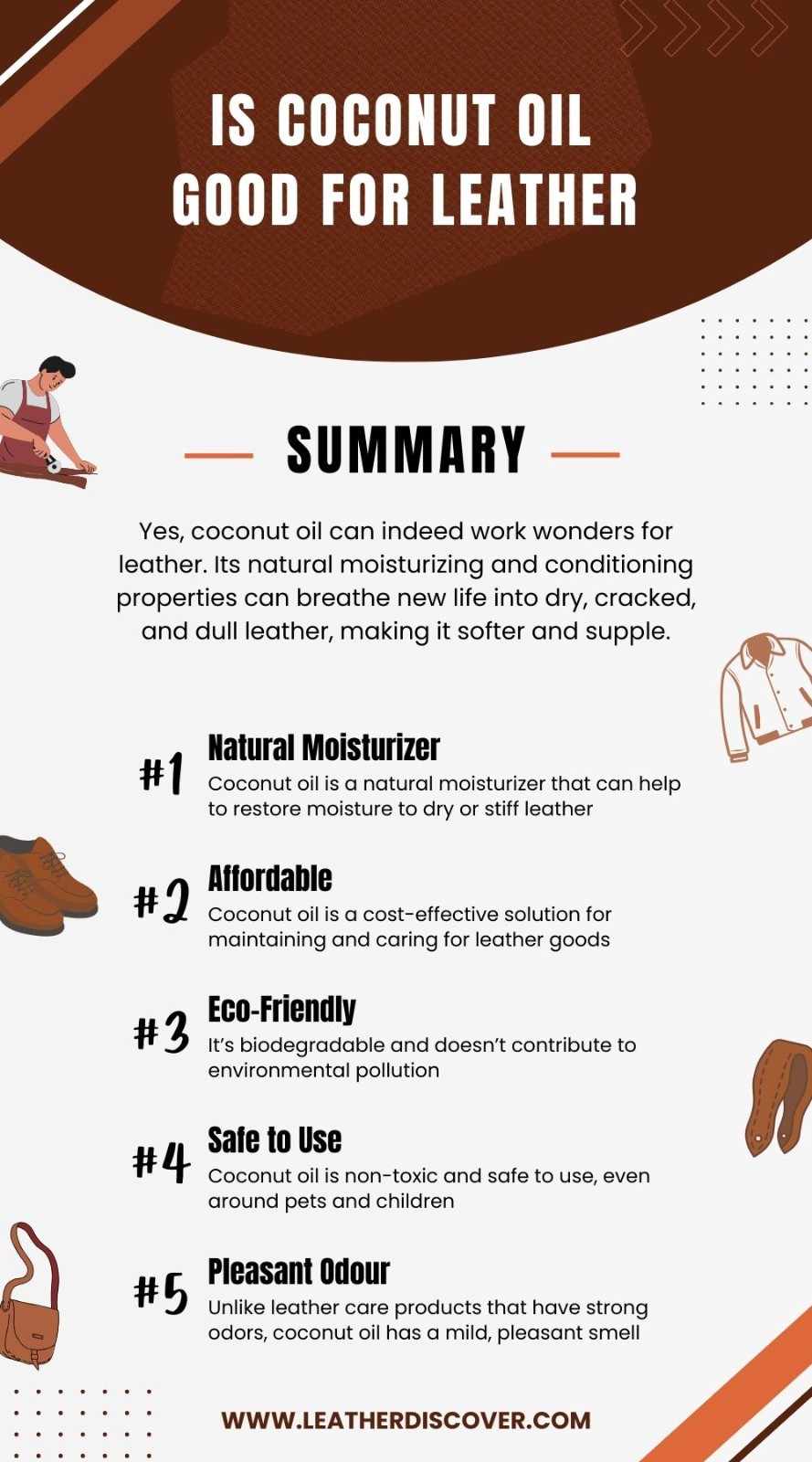Coconut oil is often praised as a versatile, natural solution for various household uses, but can it truly benefit leather?
Yes, coconut oil can indeed work wonders for leather.
Its natural moisturizing and conditioning properties can breathe new life into dry, cracked, and dull leather, making it softer and supple.
Coconut oil is rich in fatty acids that penetrate the leather, improving its texture and longevity.
I first tried coconut oil on my leather bag, which had become stiff and worn over the years. After a few applications, the leather became noticeably softer and shinier.
In this blog, we’ll explore the effectiveness of coconut oil on leather, its benefits, and potential drawbacks, and share practical tips on how to use it effectively.

How to Apply Coconut Oil on Leather
Applying coconut oil on leather is a beneficial way to condition and moisturize it. Here’s how to apply coconut oil on leather:
1. Choose the Right Coconut Oil
Opt for organic coconut oil for the best results. Make sure it’s free from any additives or fragrances to ensure pure nourishment for your leather.
2. Prepare Your Leather
Before applying the oil, clean your leather item with a damp cloth to remove dust or dirt. Allow it to dry completely before moving on to the next step.
3. Test a Small Patch
Always, test any new product on a hidden area of your leather item first. This way, if the coconut oil reacts strangely, you haven’t ruined the whole thing.
4. Apply the Coconut Oil
Put a small amount of coconut oil in your bowl. Dip your cloth into the oil. Gently rub the oil into the leather using circular motions.
When I first did this, I was amazed at how quickly the leather absorbed the oil and started looking more vibrant.
5. Let it Soak In
Once you’ve coated the leather with coconut oil, allow it to sit and absorb the nourishment. For optimal results, leave the oil on the leather overnight to penetrate deep into the fibers.
6. Buff and Polish
Grab a clean cloth and gently buff the leather to remove excess oil. This step helps bring out the natural shine of the leather.
I regularly condition all my leather items with coconut oil, and they’ve never looked better.
Source: The Provider YT Channel
Precautions and Considerations
Here are some friendly reminders and tips to keep in mind when using coconut oil on leather:
Use a small amount of coconut oil on a clean, soft cloth or sponge. I once made the mistake of applying too much on my leather bag, it took ages to absorb.
Warming the coconut oil slightly can make it easier to apply and help it absorb better into the leather. I usually rub a small amount between my palms to melt it a bit before applying.
After applying the coconut oil, use a clean, dry cloth to buff the leather. This helps remove any excess oil and gives the leather a nice sheen.
Let the coconut oil sit on the leather for a few hours or overnight to allow it to penetrate and moisturize the material.
Once you have treated the leather with coconut oil, store the item in a cool, dry place away from direct sunlight. Proper storage helps maintain the leather’s condition.
My friend once left a freshly oiled leather bag in the car on a hot day, and later it looked worse.
Pros and Cons of Using Coconut Oil on Leather
Like any leather care product, coconut oil has its upsides and downsides. Let’s weigh the pros and cons so you can make an informed decision.
Pros:
Coconut oil is a natural moisturizer that can help to restore moisture to dry or stiff leather. I used coconut oil on my stiff leather bag, it became noticeably softer and more hydrated.
Coconut oil can condition leather, preventing cracks and extending its lifespan. It improves the leather’s texture and gives it a healthy sheen
Coconut oil is readily available and relatively affordable than commercial leather conditioners. It is a cost-effective solution for maintaining and caring for leather goods.
Using coconut oil is an eco-friendly option compared to chemical-loaded commercial leather conditioners. It’s biodegradable and doesn’t contribute to environmental pollution.
Unlike some leather care products that have strong, chemical odors, coconut oil has a mild, pleasant scent. My leather items smell wonderful after I condition them with coconut oil.
Coconut oil has natural antimicrobial properties, which can help protect your leather from mold and mildew. I once used coconut oil on leather shoes prone to getting moldy during the rainy season, and it made a difference.
Coconut oil contains natural antioxidants, such as Vitamin E, which can help protect leather from oxidative damage and prolong its lifespan
Coconut oil is non-toxic and safe to use, even around pets and children. I feel much more comfortable using coconut oil on my leather couch, knowing it’s safe for my kids and pets.
Cons:
Coconut oil can darken some types of leather, especially lighter-colored or more delicate leather. I once applied coconut oil to a light-colored leather wallet without testing it first. The oil darkened the leather slightly.
Coconut oil is a rich oil that can leave a greasy residue on the leather if excess oil is not properly removed. This residue can attract dust and dirt, affecting the appearance of the leather.
I once applied too much coconut oil to a leather jacket. It took additional buffing and wiping to restore the leather to its desired appearance.
Overuse of coconut oil can clog the pores of the leather, reducing its breathability. This can make the leather feel less natural and more synthetic over time.
While coconut oil can moisturize and condition leather effectively, its effects may not be as long-lasting as some commercial leather conditioners. Regular reapplication may be necessary to maintain the leather’s condition over time.
Source: Ask About Impact YT Channel
Coconut Leather Vs Other Popular Conditioning Options
Here’s a table comparing Coconut Oil to other popular Leather Conditioning options:
| Feature | Coconut Oil | Leather Conditioner | Mink Oil | Neatsfoot Oil | Beeswax |
|---|---|---|---|---|---|
| Natural/Synthetic | Natural | Often a blend | Natural | Natural | Natural |
| Conditioning | Light to moderate | Moderate to deep | Deep | Deep | Light |
| Water Resistance | Minor, temporary | Varies by product | Moderate | Moderate | None |
| Darkening Effect | Can darken leather | Minimal | Minimal | Minimal | Minimal |
| Application Difficulty | High (greasy, uneven) | Easy | Easy | Easy | Easy |
| Ideal for Leather Types | Not ideal for most | All leather types | Smooth leather | Dry, thick leather (boots) | Finished Leather |
| Safety | Generally safe | Generally safe | Generally safe | Generally safe | Generally safe |
Conclusion
Coconut oil can work wonders for your leather items, offering a natural and effective way to moisturize, restore shine, and extend their lifespan.
With its ability to penetrate deep into the leather fibers and its natural anti-fungal properties, coconut oil proves to be a versatile choice for leather care.
However, it’s important to proceed cautiously, especially with lighter-colored leathers, as coconut oil can darken them.
Always do a patch test in an inconspicuous area before applying coconut oil. Be mindful of environmental factors such as humidity and temperature that can affect the outcome of using coconut oil on leather.
Embrace the natural beauty of coconut oil and enjoy the rewards it brings to your leather products.
Resources Consulted
- What Is Caiman Leather? A Detailed Guide - July 25, 2024
- What Is Tumbled Leather?A Complete Guide - July 25, 2024
- What Is Kip Leather? Premium Leather Choice - July 24, 2024
